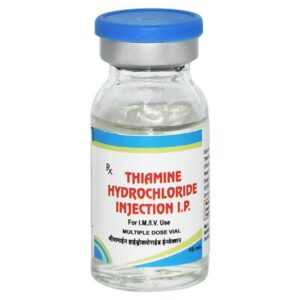VITAMIN B1 (THIAMINE)
VITAMIN B1 (THIAMINE): Drug: Vitamin B1 (Thiamine)
Use: Vitamin B1, also known as thiamine, is an essential nutrient required for the normal functioning of the body. It is used as a dietary supplement to treat and prevent thiamine deficiency, which can lead to a condition called beriberi. Thiamine deficiency is commonly seen in individuals with alcoholism, malnutrition, or malabsorption disorders. Thiamine supplements can also be used to help manage certain neurological conditions, such as Wernicke-Korsakoff syndrome.
Mechanism of Action: Thiamine plays a crucial role in the metabolism of carbohydrates, helping the body convert food into energy. It is a cofactor for several enzymes involved in energy production pathways. Thiamine is particularly important for the proper function of the nervous system and the heart. It acts as a coenzyme in the synthesis of neurotransmitters and myelin, which are essential for nerve transmission.
Dose: The recommended daily intake of thiamine varies depending on age, sex, and medical condition. In general, the recommended dietary allowance (RDA) for adults is between 1.1 to 1.2 mg/day for men and 0.8 to 1.1 mg/day for women. However, higher doses may be required for individuals with thiamine deficiency or certain medical conditions, as directed by a healthcare professional.
Thiamine supplements are available in various forms, including tablets, capsules, and injections. The appropriate dose and form of thiamine will be determined by a healthcare provider based on the individual’s specific needs.
Side Effects: Thiamine supplementation is generally considered safe when taken within the recommended dosage range. It is water-soluble, meaning excess thiamine is excreted in urine rather than stored in the body. Therefore, toxicity from thiamine is rare. However, some individuals may experience mild side effects, including stomach upset, nausea, and allergic reactions. Very rarely, high-dose thiamine injections can cause anaphylactic reactions or hypersensitivity.
It is important to consult a healthcare professional before starting any vitamin supplement, including thiamine, to determine the appropriate dosage and to rule out any potential drug interactions or contraindications.

